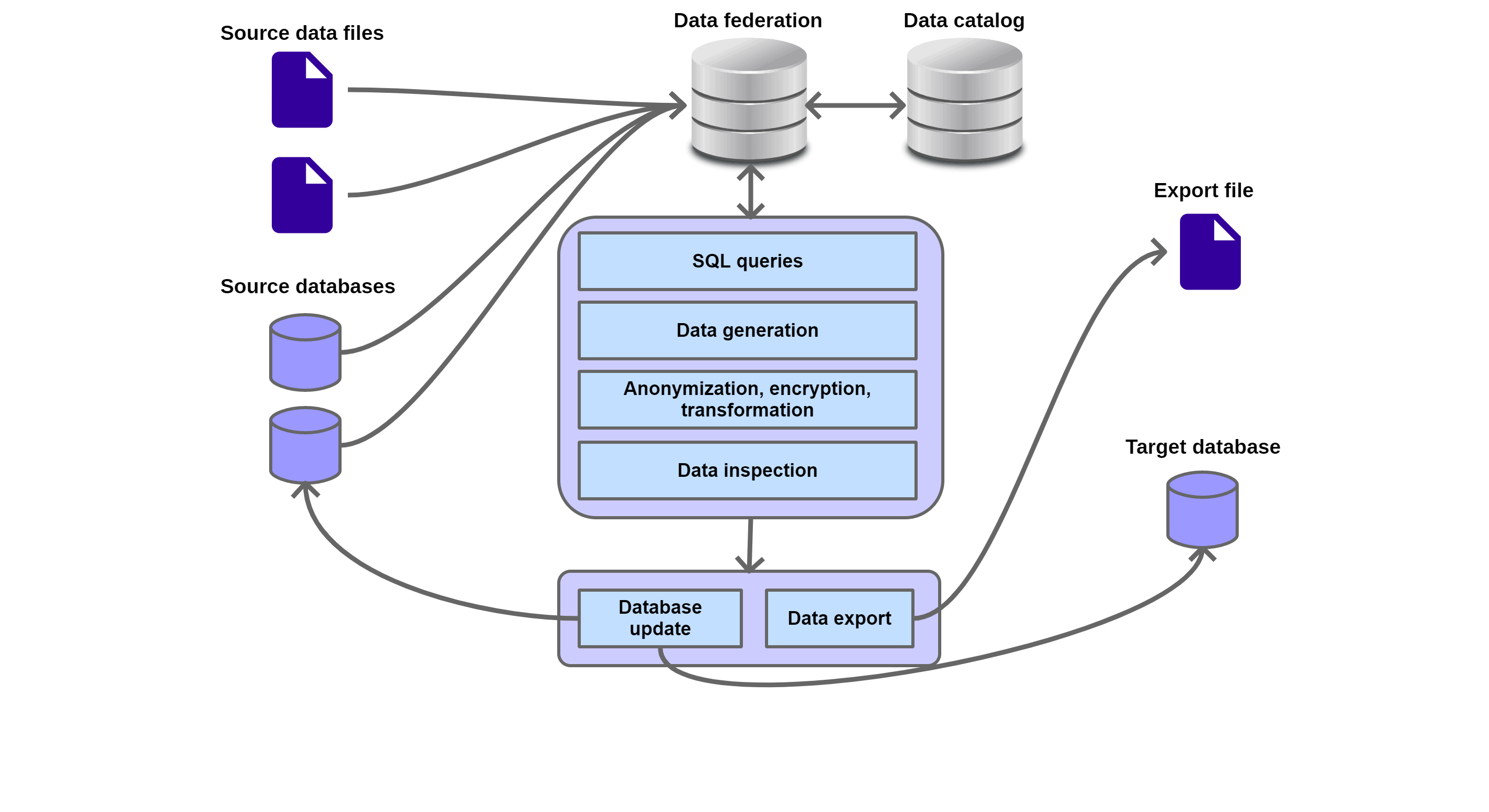EasyDataTool allows you to easily manage your data
EasyDataTool is a data management software that offers a set of integrated application features enabling querying, sensitive data detection, anonymization or encryption of data, data governance, data lineage, data migration and generation of data for testing.
Its features are linked and interact with each other.
This makes it easy to manage data without having to change tools.
data Queries
Make queries on multiple data sources (files, databases,...)
Data security
Detect sensible data and easy transform it (anonymize, encrypt..)
Data Governance
Build a data catalog to facilitate your data governance
Data migration
Easily migrate a data source to other data sources
Data generation
Generate new data to provide datasets for your tests
EasyDataTool

data Queries
EasyDataTool allows you to easily make queries :
- Queries can be multiple data sources by linking different types of data format : files (Excel, CSV, JSON, XML, TXT, EPUB, PDF, DOC, PPT, databases (MySQL, PostgreSQL, SQLite, MS Access, Oracle, SQL Server, IBM DB2, Teradata, MongoDB) .
- The users can simply launch the queries without knowing the SQL language (selection of the various criteria in lists of values).
- An editor also allows direct execution of SQL code by including prompts for selecting values at run time.
Use cases : data extraction from different sources, frequent launching of queries and restitution in Excel format
Data security
EasyDataTool makes it easy to secure your data :
- The Data Inspector provides an overview of your data sources and detects sensitive data based on field names, table names, keywords, or regular expressions.
- The result of the data inspection can be quickly displayed in a Powerpoint report.
- Functions are available to transform your data, in particular to anonymize or encrypt it in order to comply with the GDPR.
- It is also possible to add your own functions.
Use cases : detection of sensitive data, anonymization of databases, file encryption to export data outside the company…
Data governance
EasyDataTool allows you to build a data catalog :
- Business functional data can be cataloged and easily linked to technical data to facilitate data governance.
- The Data Catalog is linked to the Data Inspector and facilitates the anonymization of different data sources by reusing the same anonymization functions.
- The catalog also includes a function to measure the quality of the data.
- Coupled with the data inspector, it is possible to log the results of the inspections and to detect between two inspections, the changes on the inspected sources (arrival of new tables or fields, modification of fields, deletion of tables or fields) .
- It is possible to create data lineages that display the path of data in the information system. Data quality indicators from the data inspector are displayed on the journey, allowing you to detect any degradation in data quality.
Use cases : build a catalog of functional company data and easily link it to a technical data repository to simplify and standardize quality or anonymization, build easily data lineages, detect source structure changes
data migration
EasyDataTool allows you to migrate data :
- From one data source to other data sources of different types (between files or databases).
- Update an existing data source.
- Delete data according to different criteria.
- Easily export data as different types of files (Excel, CSV, JSON, XML).
- Mass manage a set of files to copy, move, rename or delete them.
- EasyDataTool manages large volumes of data with its automatic batch data processing system which does not saturate the memory.
- Launch operations in batch mode
Use cases : Migrating data from one database to another of a different type.
data generation
EasyDataTool allows you to generate new data for your testing needs. Different functions are available :
- Generating data based on regular expressions.
- Generation of technical identifiers (numeric or character type).
- Random generation of data (fictitious dates, fictitious amounts, etc.).
- Possibility to create new user functions (Python language).
Use cases : generate new data to perform tests.
